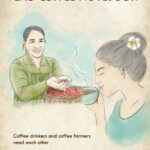
45 downloads
Title of document: The Lao Coffee Notebook Authors/editor: RURAS and Comma Coffee Journal’s name if any: Ministry/Government Agency/Organization: RURAS and Comma Coffee Year of publication: 2020 Geographic focus: Lao Main issues/ topics addressed (for example: Coffee Production, processing roasting and brewing, including a map, statistics…) School of agroecology (if any): Web address to original document (if any): https://laocoffee.org/2020/10/03/lao-coffee-notebook/ Summary: The Lao Coffee Notebook is now available! Produced by LURAS in cooperation with Comma Coffee, this unique notebook is packed with information about coffee production, processing roasting and brewing, including a map, statistics and a Lao-English wordlist, all of which has been beautifully illustrated by Tina at Helvetas. Read More
19 downloads
Title of document: Ecological pest control fortifies agricultural growth in Asia–Pacific economies Authors/editor: Kris A. G. Wyckhuys, Yanhui Lu, Wenwu Zhou, Matthew J. W. Cock, Steven E. Naranjo, Atumurirava Fereti, Frances E. Williams & Michael J. Furlong Journal’s name if any: nature ecology & evolution Ministry/Government Agency/Organisation: nature ecology & evolution Year of publication: 2020 Geographic focus: Asia Main issues/ topics addressed (for example: …) School of agroecology (if any): Web address to original document (if any): https://www.nature.com/articles/s41559-020-01294-y Summary: The Green Revolution is credited with alleviating famine, mitigating poverty and driving aggregate economic growth since the 1960s. In Asia, high-input technology packages secured a tripling of rice output, with germplasm improvements providing benefits beyond US$4.3 billion yr–1. Here, we unveil the magnitude and macro-economic relevance of parallel nature-based contributions to productivity growth in non-rice crops over the period 1918–2018 (across 23 different Asia–Pacific geopolitical entities). We empirically demonstrate how biological control resolved invasive pest threats in multiple agricultural commodities, ensuring annually accruing (on-farm) benefits of US$14.6–19.5 billion yr–1. Scientifically guided biological control of 43 exotic invertebrate pests permitted 73–100% yield-loss recovery in critical food, feed and fibre crops including banana, breadfruit, cassava and coconut. Biological control thereby promoted rural growth and prosperity even in marginal, poorly endowed, non-rice environments. By placing agro-ecological innovations on equal footing with input-intensive measures, our work provides lessons for future efforts to mitigate invasive species, restore ecological resilience and sustainably raise output of global agrifood systems… Read More
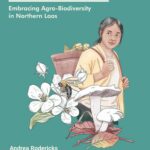
44 downloads
Title of document: LIVING LANDSCAPES Embracing Agro-Biodiversity in Northern Laos Authors/editor: Andrea Rodericks Journal’s name if any: Ministry/Government Agency/Organisation: TABI Year of publication: 2020 Geographic focus: Lao PDR Main issues/ topics addressed (for example: …) School of agroecology (if any): Web address to original document (if any): https://www.phakhaolao.la/publications/living-landscapes-embracing-agro-biodiversity-northern-laos?fbclid=IwAR1PdBY2QRGw9A9Yqunt03SZTJw7EqO1gJnHpI7250CwFQD9CNP9O9qgh_c Summary: The Lao uplands have long been recognized for their rich agro-biodiversity. Home to globally important species of animals, plants, and micro-organisms, this agro-biodiversity is the legacy of the upland farmers’ agricultural knowledge and practices passed down over generations. Towards the end of the 20th century and the start of this one, the agrarian transition and the integration of Laos into the regional and global economy brought economic opportunity to upland communities. It also brought challenges and contradictions for traditionally subsistence farmers and threats to the biodiversity of the region. Read More
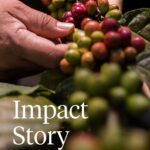
4 downloads
Title of document: Impact Story - AFOSP Authors/editor: AFOSP Journal’s name if any: Ministry/Government Agency/Organisation: AFOSP Year of publication: 2020 Geographic focus: ASEAN Main issues/ topics addressed (for example: …) School of agroecology (if any): Web address to original document (if any): http://www.asiapacificfarmersforum.net/afosp-impact-story/ Summary: Farmers who are coming from 10 member states of ASEAN ,These impact stories of our beneficiaries throughout the four years implementation of AFOSP and how their effort of improving their farming industry impacted the lives of many. This impact story is included: 1. Chapter 1 | Why It Matters & About AFOSP. 2. Chapter 2 | AFOSP Journey. 3. Chapter 3 | Photo of ASEAN - EU. 4. Chapter 4 | ASEAN Roadmap for Enhancing the Role of Agriculture Cooperative in the Global Value Chain 2018 - 2025. 5. Chapter 5 | Our Farmers Our Story. 6. Lesson Learned Read More
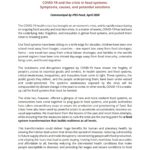
3 downloads
Title of document: COVID-19 and the crisis in food systems: Symptoms, causes, and potential solutions Authors/editor: IPES-Food Journal’s name if any: Ministry/Government Agency/Organisation: IPES-Food Year of publication: 2020 Geographic focus: Global level Main issues/ topics addressed (for example: …) School of agroecology (if any): Web address to original document (if any): Summary: The COVID-19 health crisis has brought on an economic crisis, and is rapidly exacerbating an ongoing food security and nutrition crisis. In a matter of weeks, COVID-19 has laid bare the underlying risks, fragilities, and inequities in global food systems, and pushed them close to breaking point. Our food systems have been sitting on a knife-edge for decades: children have been one school meal away from hunger; countries – one export ban away from food shortages; farms – one travel ban away from critical labour shortages; and families in the world’s poorest regions have been one missed day-wage away from food insecurity, untenable living costs, and forced migration… Read More
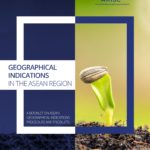
19 downloads
Title of document: Geographical Indications in the ASEAN Region Authors/editor: ARISE+ IPR Journal’s name if any: Ministry/Government Agency/Organisation: ARISE+ IPR, EU Year of publication: 2019 Geographic focus: South East Asia Main issues/ topics addressed (for example: overview about geographical indications in the ASEAN region; geographical indications protection in each ASEAN member state; protection of geographical indications in the European Union and international markets…) School of agroecology (if any): Web address to original document (if any): Summary: A booklet on ASEAN Geographical Indications procedure and products The ARISE Plus Intellectual Property Rights (ARISE+ IPR) programme is one of the components under the Enhanced ASEAN Regional Integration Support from the European Union (EU)The overall objective of ACTAE project is to build durable and effective mechanisms to facilitate synergies among initiatives contributing to an agro-ecological transition in South East Asia. ARISE+ IPR programme supports regional integration through Intellectual Property (IP) cooperation and aims to upgrade the IP systems for creation, protection, utilisation, administration and enforcement, in line with international best practices and standards and the strategic objectives of the ASEAN Intellectual Property Rights Action Plan 2016-2025. Read More
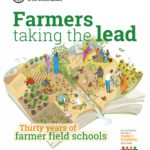
23 downloads
Title of document: Farmers taking the lead: Thirty years of farmer field schools Authors/editor: FAO Journal’s name if any: Ministry/Government Agency/Organisation: FAO Year of publication: 2019 Geographic focus: Global level Main issues/topics addressed (for example: …) School of agroecology (if any): Web address to the original document (if any): http://www.fao.org/documents/card/en/c/CA5131EN/ Summary: The Farmer Field School (FFS) has been one of the most successful approaches developed and promoted by FAO over the past three decades, empowering farmers to become better decision-makers in their own farming systems. Initiated by FAO in 1989, and subsequently adopted by many other organizations and institutions, the FFS programs constitute one of the most important “results of the collective action of millions of small-scale farmers” that FAO has supported. FFS is interactive and participatory learning by doing approach that offers farmers, pastoralists, fisherfolks, foresters and their communities a place where they can learn from each other, share experiences, co-create knowledge and try new ways of doing. Participants enhance their understanding of agro-ecosystems, resulting in production systems that are more resilient and optimize the use of available resources. FFS aims to improve farmers’ livelihoods and recognize their role as innovators and guardians of natural environments. FFS has attained plenty of outstanding achievements in all aspects of agriculture and rural development. Read More
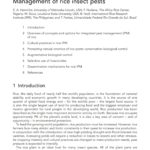
23 downloads
Title of document: Management of rice insect pests Authors/editor: E. A. Heinrichs; F. Nwilene; M. Stout; B. Hadi and T. Freitas Journal’s name if any: Ministry/Government Agency/Organisation: Burleigh Dodds Science Year of publication: 2017 Geographic focus: Global level Main issues / topics addressed (for example: Introduction; Overview of concepts and options for integrated pest management (IPM) of rice; Cultural practices in rice IPM…) School of agroecology (if any): Web address to original document (if any): https://www.taylorfrancis.com/books/e/9781351114196 Summary: This is a part of the “Achieving sustainable cultivation of rice Volume 2 - Cultivation, pest and disease management” Read More
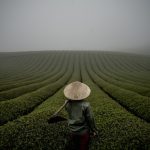
16 downloads
Title of document: State of Land in the Mekong Region – Highlight (Version Vietnamese) Authors/editor: Micah L. Ingalls, Jean-Christophe Diepart, Nhu Truong, Daniel Hayward, Tony Neil, Chanthavone Phomphakdy, Rasso Bernhard, Sinu Fogarizzu, Michael Epprecht, Vong Nanhthavong, Dang H. Vo, Dzung Nguyen, Phong A. Nguyen, Thatheva Saphangthong, Chanthaviphone Inthavong, Cornelia Hett and Nicholas Tagliarino Journal’s name if any: Ministry/Government Agency/Organisation: CDE, MRLG Year of publication: 2019 Geographic focus: Mekong Regional Main issues / topics addressed (for example: …) School of agroecology (if any): Web address to original document (if any): http://mrlg.org/resources/state-of-land-in-the-mekong-region_hilight_vietnamese/ Summary: The report “State of Land in the Mekong Region” was launched today in Vientiane, Lao PDR. The first publication of its kind in the Mekong Region, it brings together key data and information on the current status of, and changes in, land resources, their social distribution, and the conditions of governance that shape them. The report stresses the need for urgent action towards transformational change. It was co-produced by the Centre for Development and Environment (CDE) of the University of Bern and the Mekong Region Land Governance Project (MRLG). Funding was provided by Switzerland, Germany, and Luxembourg. The Mekong region – Cambodia, Lao PDR, Myanmar, Thailand, and Vietnam – is in the midst of profound social and environmental change. Despite rapid urbanization, the region remains predominantly rural. More than 60 per cent of its population live in rural areas, and the vast majority of these people are engaged in agriculture. Due to rapid growth of its agricultural sector, the Mekong region has become a global centre of production and trade for commodities such as rubber, rice, cassava, wood, sugar cane, and palm oil. Between 1996 and 2015, overall agricultural land in the Mekong region grew by 20 per cent, or around 9 million hectares. Most of this expansion has occurred at the expense of the region’s natural capital – especially forests and other vegetation. Read More
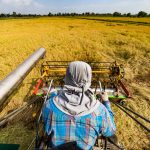
4 downloads
Title of document: State of Land in the Mekong Region – Highlight (Version Thai) Authors/editor: Micah L. Ingalls, Jean-Christophe Diepart, Nhu Truong, Daniel Hayward, Tony Neil, Chanthavone Phomphakdy, Rasso Bernhard, Sinu Fogarizzu, Michael Epprecht, Vong Nanhthavong, Dang H. Vo, Dzung Nguyen, Phong A. Nguyen, Thatheva Saphangthong, Chanthaviphone Inthavong, Cornelia Hett and Nicholas Tagliarino Journal’s name if any: Ministry/Government Agency/Organisation: CDE, MRLG Year of publication: 2019 Geographic focus: Mekong Regional Main issues / topics addressed (for example: …) School of agroecology (if any): Web address to original document (if any): http://mrlg.org/resources/state-of-land-in-the-mekong-region-highlight_thai/ Summary: The report “State of Land in the Mekong Region” was launched today in Vientiane, Lao PDR. The first publication of its kind in the Mekong Region, it brings together key data and information on the current status of, and changes in, land resources, their social distribution, and the conditions of governance that shape them. The report stresses the need for urgent action towards transformational change. It was co-produced by the Centre for Development and Environment (CDE) of the University of Bern and the Mekong Region Land Governance Project (MRLG). Funding was provided by Switzerland, Germany, and Luxembourg. The Mekong region – Cambodia, Lao PDR, Myanmar, Thailand, and Vietnam – is in the midst of profound social and environmental change. Despite rapid urbanization, the region remains predominantly rural. More than 60 per cent of its population live in rural areas, and the vast majority of these people are engaged in agriculture. Due to rapid growth of its agricultural sector, the Mekong region has become a global centre of production and trade for commodities such as rubber, rice, cassava, wood, sugar cane, and palm oil. Between 1996 and 2015, overall agricultural land in the Mekong region grew by 20 per cent, or around 9 million hectares. Most of this expansion has occurred at the expense of the region’s natural capital – especially forests and other vegetation. Read More

 Asia & Mekong Region
Asia & Mekong Region  Cambodia
Cambodia  Laos
Laos  Myanmar
Myanmar  Other
Other  Vietnam
Vietnam